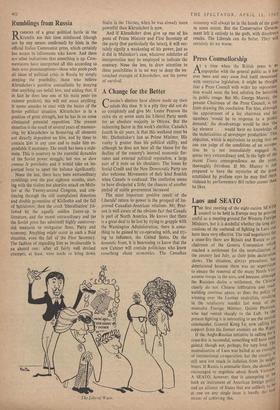Rumblings from Russia
RUMOURS of a great political battle in the Kremlin are this time reinforced (though not by any means confirmed) by hints in the official Italian Communist press, which certainly has access to informants who know. And there are other indications that something is up. Com- mentators have interpreted all this according to their own preconceptions—those who pooh-pooh all ideas of political crisis in Russia by simply denying the possibility, those who believe Khrushchev's position unassailable by denying that anything can befall him, and adding that, if in fact he does lose one of his main posts (as rumour predicts), this will not mean anything. It seems sounder to start with the basics of the Soviet political situation. Khrushchev is in a position of great strength, but he has in no sense eliminated potential opposition. The present situation is the result of several years of manoeuv- ring, by Khrushchev to hamstring all elements not directly dependent on him, and by these to contain him in any case and to make him ex- pendable if necessary. The result has been a stale- mate. This is contrary to the essential dynamics of the Soviet power struggle, but rien ne dare comme le provisoire and it would take an im- portant issue to upset the balance significantly.
None the less, there have been extraordinary rumblings over the past eighteen months, start- ing with the violent but abortive attack on Molo- tov at the Twenty-second Congress, and con- tinuing through the still unexplained demotion and double promotion of Kirilenko and the fall of Spiridonov, then the crash 'liberalisation' fol- lowed by the equally sudden freeze-up in literature, and the recent extraordinary and (as the Soviet press has admitted) highly controver- sial measures to reorganise State, Party and economy. Anything might occur in such a fluid situation, even the fall of the First Secretary. The fashion of regarding him as invulnerable is an absurd one: after all fairly well devised attempts, at least, were made to bring down Stalin in the Thirties, when he was already more powerful than Khrushchev is now.
And if Khrushchev does give up one of his posts of Prime Minister and First Secretary of the party (but particularly the latter), it will cer- tainly signify a weakening of his power, just as it did in Malenkov's case, whatever subtleties of interpretation may be employed to indicate the contrary. None the less, to draw attention to these possibilities is in no way to deny the en- trenched strength of Khrushchev, nor his power of survival.


































 Previous page
Previous page